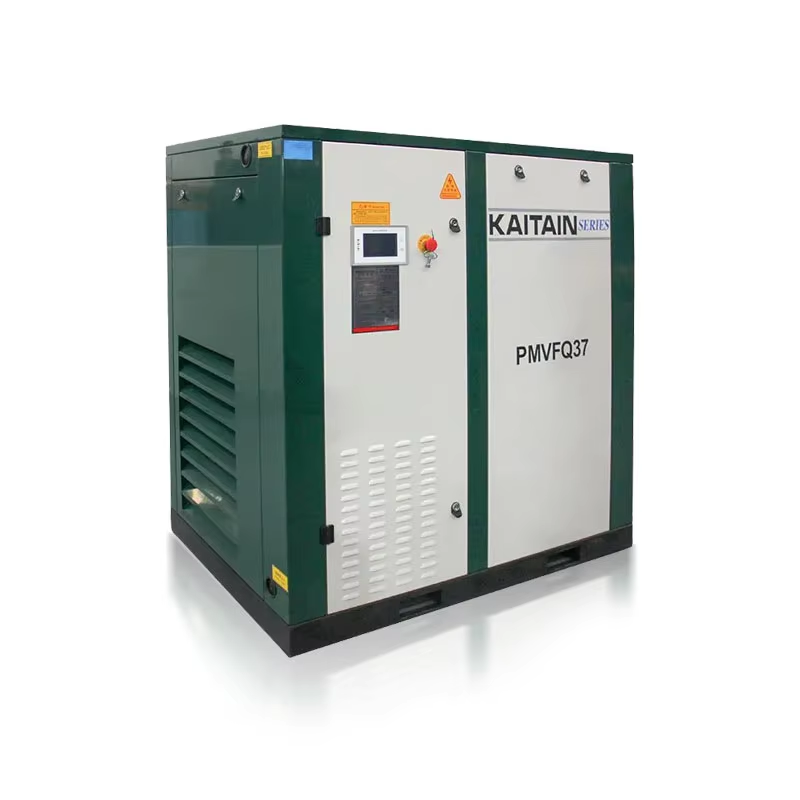Understanding Common Air Compressor Machine Issues
Why Regular Maintenance Matters for Screw Compressors Machine
Keeping screw compressors running efficiently and lasting longer depends on regular maintenance checks. When technicians look for problems early on, they catch small issues before they turn into big repair bills or equipment breakdowns. The standard maintenance checklist usually involves looking at air filters, making sure oil levels are correct, and verifying that all electrical connections remain tight and working as intended. Taking this kind of preventative action helps maintain smooth operations while improving how much energy these machines actually consume. According to industry data, properly maintained compressors tend to cut down energy expenses somewhere between 10% and 30%. That's real money saved over time, which explains why many plant managers prioritize scheduled maintenance despite the upfront labor costs involved.
Key Indicators of Screw Air Compressor Problems
Keeping an eye on certain performance metrics helps catch air compressor problems before they get out of hand. What technicians watch for includes things like strange pressure readings, temperature swings, and odd noises coming from the unit. These are red flags that something isn't quite right underneath. Take a sudden drop in pressure or louder than normal operation as examples. Those could mean there's a leak somewhere or parts wearing down faster than expected. Higher energy usage is another sign worth noting since this usually points to system inefficiencies. Most techs grab pressure gauges and thermal imaging devices when checking these signs. When maintenance crews spot these warning signals quickly, small troubles don't turn into major breakdowns. This proactive approach keeps compressors running reliably while saving money on repairs and downtime over time.
Low Air Pressure: Causes and Solutions
Diagnosing Airflow Restrictions in Screw Air Compressors
When there are airflow restrictions in screw air compressors, performance takes a hit most of the time because something is blocking the pipes or clogging up the filters somewhere along the line. Checking those parts regularly helps catch problems early before they cause all sorts of headaches with low air pressure situations. The best approach? Get into the habit of looking at air filters and running through the duct system every so often. This lets maintenance folks spot small issues while they're still manageable instead of waiting until everything goes wrong. Don't forget to test for pressure drops now and then too since maintaining good airflow matters a lot for proper operation. Industry reports show roughly between fifteen to twenty percent of all air compressor troubles come down to bad airflow somehow. That number alone makes clear why getting an accurate diagnosis when things start acting funny should be top priority for anyone responsible for keeping these machines running smoothly.
Fixing Clogged Filters and Faulty Regulators
When filters get clogged up, they become a major problem for airflow, blocking most of what should be passing through while creating noticeable pressure drops across the system. Keeping things running smoothly means cleaning those filters out every few months or swapping them out completely if they're too dirty. The same goes for pressure regulators that keep everything balanced within the system. These components need regular checks to make sure they're still reading correctly. If a regulator starts acting up, pressure readings will fluctuate all over the place. Replacing one of these parts before it fails completely can bring back stable operation and might even boost overall efficiency somewhere around 25% or better in some cases. Fixing both filter blockages and faulty regulators right away helps compressors work properly without wasting energy or risking damage down the line.
Air Leaks in Compressed Air Systems
Locating Leaks Using Sound and Detection Solutions
Finding air leaks in compressed air systems matters a lot for keeping things running efficiently and cutting down on energy bills. Most people start with sound checks because leaks usually make a telltale hiss that stands out against normal system noises. When leaks aren't loud enough to hear, ultrasonic detectors come into play. These tools pick up high frequency vibrations from escaping air, letting technicians pinpoint problems even when they're not obvious. The savings add up fast too many plants report saving around 25% on their compressed air costs after fixing major leaks. Getting serious about leak detection isn't just about saving money either it helps maintain consistent pressure throughout the system, which prevents equipment damage and keeps production schedules on track.
Repairing Fittings, Valves, and Hose Connections
Fixing those fittings, valves, and hose connections matters a lot when it comes to keeping compressed air systems working properly. Most plant managers know that checking things regularly and doing basic maintenance stops leaks from happening in the first place. When technicians use the right seals and materials for connections, they get much better results and reduce failure risks significantly. According to maintenance specialists across manufacturing sectors, fixing air leaks through regular upkeep pays off fast because companies save so much on their energy bills. Setting up a routine check schedule keeps everything running smoothly and catches small problems before they turn into big headaches. This kind of proactive approach not only saves money but also extends how long the equipment lasts without needing major replacements.
Overheating and Oil Contamination Challenges
Preventing Motor Damage in Screw Compressors
When screw air compressors overheat, they often suffer serious motor damage that can bring operations to a halt. Preventing this requires proper cooling systems and good thermal management practices. Checking coolant levels on a regular basis and making sure vents aren't blocked helps keep things running smoothly. Industry data shows just how bad overheating problems can get for equipment lifespan. Some studies indicate motors may only last half as long when exposed to excessive heat regularly. For anyone responsible for maintaining these machines, taking steps to control temperature issues makes all the difference in getting maximum service life out of their compressors.
Managing Oil Quality and Lubrication Best Practices
Getting oil management right makes all the difference in keeping screw compressors running efficiently. When oil gets dirty or degraded, it doesn't just cause problems it actually brings operations to a halt and breaks down components over time. Checking oil regularly through lab analysis helps spot issues before they become major headaches for maintenance teams. Most manufacturers have clear guidelines on how often to change oil based on usage conditions, and sticking to those schedules prevents most lubrication problems from happening in the first place. Industrial facilities that follow proper oil maintenance routines typically see fewer breakdowns during production cycles, which means less wasted time fixing equipment and more consistent output across shifts.
Motor Failures and Unusual Noises
Addressing Electrical Faults in Rotary Screw Units
When electrical problems hit rotary screw compressors, operations come grinding to a halt pretty fast. That's why regular inspections matter so much for catching issues before they blow up. Watch out for warning signs such as components getting too hot, circuits tripping unexpectedly, or lights that flicker randomly around the facility. These are red flags pointing toward possible electrical trouble spots. Some research into factory machinery indicated that sticking to scheduled electrical maintenance might cut down unplanned stoppages by about 30 percent. Getting a skilled electrician involved makes sense here because their trained eyes spot problems long before they turn into expensive fixes. A good plan for sorting out electrical issues in compressors keeps things running smoothly most of the time and saves headaches when production needs to stay online.
Troubleshooting Worn Bearings and Loose Components
When bearings start wearing down, they tend to make strange noises and eventually fail completely, which means regular inspections are pretty much mandatory. During routine checks, mechanics need to get right into those bearings and look for signs of wear before bigger problems develop. Loose parts are another common issue that causes vibrations throughout the system, adding unwanted noise levels. Make sure every connection point is properly secured and all fittings are tight enough to hold firm under pressure. Don't forget to go through those screws and bolts periodically too. Keeping them snug helps avoid premature wear on various components. Stick with this maintenance schedule and most bearing troubles can be caught early, while also ensuring everything stays firmly in place so the air compressor runs smoothly day after day.
Proactive Steps to Avoid Air Compressor Breakdowns
Implementing Screw Air Compressor Maintenance Schedules
Keeping up with regular maintenance for screw compressors really matters if we want them to last longer. When businesses create schedules that match exactly what their particular compressor needs, they keep everything running smoothly and cut down chances of sudden breakdowns. Most manufacturers recommend certain service intervals, which makes sense because following these guidelines helps equipment stay reliable over time. The upside? Fewer interruptions during production plus better value from the initial purchase price. Some studies show that companies sticking to proper maintenance routines save around 30% on repair bills caused by unexpected failures. Looking at things practically, fixing small issues before they become big problems means operations run without hiccups, so the air compressor continues supporting whatever tasks the business requires day after day.
When to Seek Professional Repair Services
Knowing when something's wrong with an air compressor before it completely breaks down saves time and money. If problems keep coming back even after regular maintenance work, this usually means it's time to call in someone who knows what they're doing. Things like electrical problems, weird noises from the motor, or big oil leaks aren't things most people can fix themselves. Getting advice from a qualified technician gives businesses a clear plan for fixing these issues, which cuts down on how long machines sit idle waiting to be fixed. For companies relying on their compressors day in and day out, investing in professional help actually extends how long the machine lasts while keeping energy costs under control. Most shop owners will tell anyone willing to listen that spending a little now prevents wasting a lot later on replacements and lost production time.

